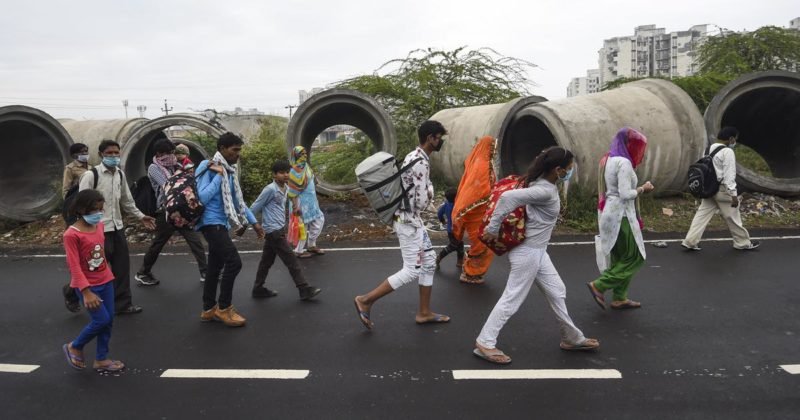COVID-19 Impacts: Assessing social and humanitarian crisis in India

Along with taking many lives, COVID-19 has given many scars to thousands of people without infecting them directly. Prime Minister Modi enacted the 21 days national lockdown on 24 March, with just four hours notice, leaving no time for millions of construction workers, street vendors, cleaners and others who earn daily or weekly wages in a vast informal economy to secure salaries or reach their native place.
Visuals showing people all across the country walking on foot back to their villages or native place are quite disturbing. This complete lockdown in the country has resulted in a catastrophic situation. There are no trains and no buses, people are hungry and have fear in their eyes. These people are huge in numbers and with them, they may be carrying this deadly virus, which can further impact many others. It becomes difficult for the administration to scan each person individually.
Read: COVID-19: A manufactured cruelty of China and WHO?
However, the state governments have assured the people about their food and other basic necessities. But somehow there is an emotional calling, that force these people to move to their native place. A lockdown without proper planning is quite questionable. The inability to anticipate the flight of migrant workers out of the big cities or prevent it with the recently announced relief package and other initiatives to keep people in place is not feasible for India’s wider challenges in dealing with the virus.
In the latest study by experts at the Indian Council of Medical Research (ICMR) has estimated that India may be able to reduce its Covid-19 cases by 62 percent if social distancing and quarantines are strictly observed. The key to preventing the viral infection from spreading is imposing restrictions on the movement of people and keeping them away from coming in contact with those who have contracted the disease or are showing its symptoms.

There was no refusal about the fact that the epidemic would be devastating. This denial was more psychological than scientific. Science was always on the side of the inevitability of the epidemic. ICMR has told “The idea is to prepare for the surge. If the numbers that we see in the studies are correct, we will be having millions of people infected. Our current health system is not geared to respond to that number of people. Massive efforts are going on in terms of creating capacity.”
Government has already announced a $22-billion relief package including cash handouts and other benefits for low-income Indians. But it is speculated that, will this package help the stranded workers, many of whom might lack documents proving their eligibility.
People are who are involved in emergency services are working day and night to fight this menace. But there are many issues involved, they are finding a shortage of protective gears and the stress of fighting with this pandemic is adversely impacting their health also. Their fear has increased more by the news that more than 50 health workers have lost their lives in Italy due to this disease.
People are in lockdown and this is impacting them mentally too. Social interaction has just left and confined to social media platforms. But being a social animal, humans have a tendency to meet people and get-together with each other. Some reports suggest that there are racial attacks been done on the people from northeastern states. People link them with China and call them as responsible for spreading coronavirus.
This lockdown has adversely impacted the lives of many people who are already suffering due to some severe disease. Heart patients, people who are on dialysis and many others who consistently require medical care are not able to get this due to break in a transportation facility and involvement of health workers in fighting COVID-19.

There are reports that people have started doing misconduct to the doctors and other medical workers, who are working in hospitals between the COVID-19 patients. The neighbourhood of these people is in constant fear that, they can bring the virus and everyone else would be infected also.
The one section of the population that is painfully, but sadly not surprisingly, absent from this discussion of negative consequences is the women. Painfully because the negative consequences of pandemic control measures on women are wide and deep. They are fighting twin battles, one with this pandemic and others to take care of the family. The plight of women involved in essential services is bigger. There is a need to recognise and highlight the disproportionate gender impacts of the lockdown.
Once the lockdown ends and everything will be on track. There is a need to access and do a deeper analysis of the indirect impact of this pandemic. People who have left their places are required to be brought back. There will a need to provide them with a livelihood. The proper mechanism is required to set up for future disasters. There should be a set of protocols that will define the next action in any such kind of tragic situation.


















